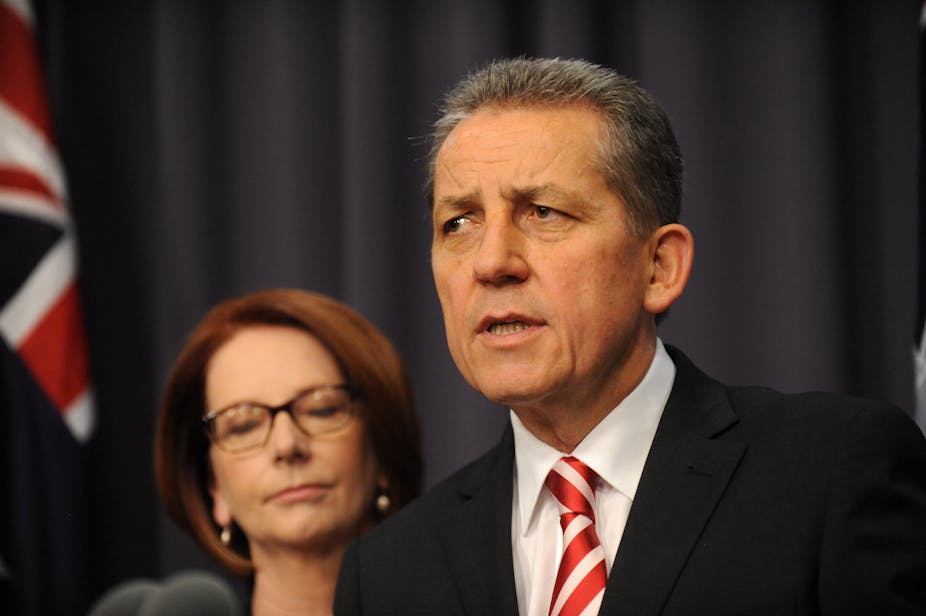The Gillard government has lost two important figures that contributed much to the Labor administration. Chris Evans, leader of the party in the Senate, and Attorney General, Nicola Roxon, both announced that they would not contest the election on September 14.
Furthermore, Roxon and Evans immediately relinquished their positions in Cabinet. Mark Dreyfus will replace Roxon as Attorney General while Chris Bowen moves into the higher education and small business ministies. Gillard favourite Brendan O'Connor takes the problematic immigration portfolio. A series of other appointments have been made to fill various parliamentary secretary roles.
This has sparked commentary about whether the government is now in a full-blown crisis and [speculation](http://www.theage.com.au/opinion/political-news/gillard-in-turmoil-20130202-2dqut.html](http://www.theage.com.au/opinion/political-news/gillard-in-turmoil-20130202-2dqut.html) about the two ministers’ motives.
Evans’ resignation will deprive the party of significant parliamentary experience. He was first elected to represent Western Australia in the Senate in 1993 and became leader of the Labor Party in the Senate in 2004. He was the Minister for Immigration and Citizenship in the Rudd Government and has been in charge of the challenging Tertiary Education portfolio since 2011.
Arguably, however, Nicola Roxon had a higher public profile than Evans, even though she first entered parliament in 1998. Representing the Victorian district of Gellibrand, Roxon was appointed by Kevin Rudd to serve as the Minister for Health and Ageing. She was later appointed by Gillard to her current role as Attorney General - the first women to hold the role - in 2011.
Roxon was credited with pushing through the plain packaging of cigarettes and withstanding the subsequent legal challenges brought about by the major tobacco companies. Furthermore, Roxon weighed into the Rudd-Gillard leadership battle of early 2012, joining the line of ministers claiming they could not, and would not, work with Rudd as prime minister again.
Moreover, a former minister, Robert McClelland, has also announced his resignation after 17 years in parliament. McClelland, who staunchly supported Rudd’s tilt at a second term as prime minister, will not contest his Sydney seat of Barton.
Adding a further dimension of interest are the machinations within the Labor Party in deciding who will replace the outgoing MPs. McClelland held Barton with a 6.9% margin which would usually be considered safe, but may be in danger if Labor suffers big swings in NSW.
Roxon’s 24% margin in Gellibrand makes it the second safest seat for Labor. This makes it a crown jewel of a seat and will be sought after by many parliamentary hopefuls within the party.
The resignations of ministers and backbenchers in the lead up to an election is not unheard of in Australian politics. Ultimately ministers will, at some point, have to leave parliament.
Prior to the last federal election 14 Labor MPs and 12 Coalition MPs resigned before going to the polls. This group included Lindsay Tanner and Jenny George from Labor and Petro Georgiou and Nick Minchin from the Coalition. In 2007 there were 16 Coalition and 12 Labor MPs that went before the polls.

Some departures were potentially more politically damaging that the current crop of resignations. For example, John Howard saw his Human Services Minister, Ian Campbell, resign some eight months before the 2007 election under intense pressure from the top.
According to Howard, Campbell’s improper action was having met with former WA Premier, and convicted fraudster, Brian Burke. At the same time, Howard also had to deal with the resignation of Senator Santo Santoro who had failed to disclose his financial interests in over 70 companies.
The current resignations of Labor MPs is not necessarily a symbol that the government is in crisis. These MPs have not left over questions of impropriety, nor have they been sacked by a prime minister who seeks to uphold Westminster conventions.
Furthermore, their resignations now give those who will replace them significant time to get on top of their portfolios and make a stronger contribution to the business of government before the election.
Their departures, however, cap off a week which saw the PM take the unusual step of announcing the date of the election so early in the year. The week also saw Craig Thomson arrested.
Combined with the minority government situation, as well as the lingering fallout from the Peter Slipper affair, the Gillard government has been fighting an uphill battle since the 2010 election.
This means that the resignations of Evans, Roxon and McClelland will elicit suggestions the government is in meltdown, even though it is not.
It is simply business as usual. But, in politics, when is the business ever really usual?

